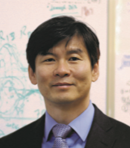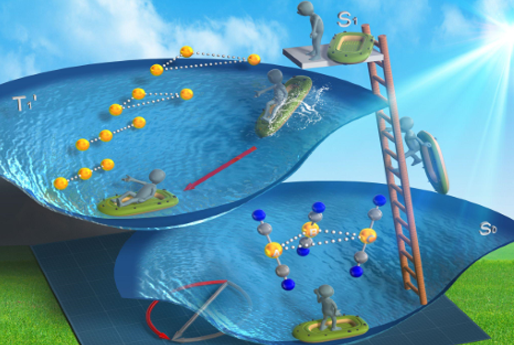주메뉴
- About IBS 연구원소개
-
Research Centers
연구단소개
- Research Outcomes
- Mathematics
- Physics
- Center for Underground Physics
- Center for Theoretical Physics of the Universe (Particle Theory and Cosmology Group)
- Center for Theoretical Physics of the Universe (Cosmology, Gravity and Astroparticle Physics Group)
- Dark Matter Axion Group
- Center for Artificial Low Dimensional Electronic Systems
- Center for Theoretical Physics of Complex Systems
- Center for Quantum Nanoscience
- Center for Exotic Nuclear Studies
- Center for Van der Waals Quantum Solids
- Center for Relativistic Laser Science
- Chemistry
- Life Sciences
- Earth Science
- Interdisciplinary
- Center for Neuroscience Imaging Research (Neuro Technology Group)
- Center for Neuroscience Imaging Research (Cognitive and Computational Neuroscience Group)
- Center for Algorithmic and Robotized Synthesis
- Center for Nanomedicine
- Center for Biomolecular and Cellular Structure
- Center for 2D Quantum Heterostructures
- Institutes
- Korea Virus Research Institute
- News Center 뉴스 센터
- Career 인재초빙
- Living in Korea IBS School-UST
- IBS School 윤리경영


주메뉴
- About IBS
-
Research Centers
- Research Outcomes
- Mathematics
- Physics
- Center for Underground Physics
- Center for Theoretical Physics of the Universe (Particle Theory and Cosmology Group)
- Center for Theoretical Physics of the Universe (Cosmology, Gravity and Astroparticle Physics Group)
- Dark Matter Axion Group
- Center for Artificial Low Dimensional Electronic Systems
- Center for Theoretical Physics of Complex Systems
- Center for Quantum Nanoscience
- Center for Exotic Nuclear Studies
- Center for Van der Waals Quantum Solids
- Center for Relativistic Laser Science
- Chemistry
- Life Sciences
- Earth Science
- Interdisciplinary
- Center for Neuroscience Imaging Research (Neuro Technology Group)
- Center for Neuroscience Imaging Research (Cognitive and Computational Neuroscience Group)
- Center for Algorithmic and Robotized Synthesis
- Center for Nanomedicine
- Center for Biomolecular and Cellular Structure
- Center for 2D Quantum Heterostructures
- Institutes
- Korea Virus Research Institute
- News Center
- Career
- Living in Korea
- IBS School
Research Centers
- Research Outcomes
- Mathematics
- Physics
- Center for Underground Physics
- Center for Theoretical Physics of the Universe (Particle Theory and Cosmology Group)
- Center for Theoretical Physics of the Universe (Cosmology, Gravity and Astroparticle Physics Group)
- Dark Matter Axion Group
- Center for Artificial Low Dimensional Electronic Systems
- Center for Theoretical Physics of Complex Systems
- Center for Quantum Nanoscience
- Center for Exotic Nuclear Studies
- Center for Van der Waals Quantum Solids
- Center for Relativistic Laser Science
- Chemistry
- Life Sciences
- Earth Science
- Interdisciplinary
- Center for Neuroscience Imaging Research (Neuro Technology Group)
- Center for Neuroscience Imaging Research (Cognitive and Computational Neuroscience Group)
- Center for Algorithmic and Robotized Synthesis
- Center for Nanomedicine
- Center for Biomolecular and Cellular Structure
- Center for 2D Quantum Heterostructures
- Institutes
- Korea Virus Research Institute
Capturing the entire process of chemical and biological reactions from start to finish.
Tel. +82-42-350-8149
IBS Center for Advanced Reaction Dynamics
IBS KAIST Campus B/D 4F, KAIST,
291, Daehak-ro, Yuseong-gu, Daejeon, South Korea
Director

Director IHEE Hyotcherl
He is a world-renowned authority in the fields of reaction dynamics and structural dynamics. As a master in the study of chemical and biological reaction mechanisms, he has received international recognition for his groundbreaking research, including the real-time observation of chemical bond formation using time-resolved X-ray scattering techniques, which has astonished the scientific community.
Introduction

Research Group captures the entire process of chemical and biological reactions from start to finish.
- - Research on mechanisms of chemical and biological reactions
- - Ultrafast structural dynamics studies using ultrashort X-ray pulses and electron pulses
- - Reaction dynamics and structural dynamics research using time-resolved spectroscopy
- - Development of time-resolved experimental techniques and data analysis methods for molecular structural dynamics research
- - Research on reaction dynamics and mechanisms through theoretical calculations and computational simulations
Main research activities
Our understanding of most reactions, such as catalytic and biological reactions, has historically been indirectly based on theoretical calculations or product analysis rather than direct experimental observation of reaction pathways. In response, the Center for Advanced Reaction Dynamics aims to establish techniques that enable direct understanding of chemical reaction mechanisms through precise experimental observations. Ultimately, this will provide the fundamental principles needed to rationally improve reaction conditions and design new methods to control chemical reactions as desired.
The Center does not limit its focus to reversible photoreactions, which have been primarily studied in the field of physical chemistry, but aims to develop experimental techniques applicable to general chemical and biological reactions. Establishing these experimental methods will provide a robust foundation for understanding chemical and biological processes. We leverage a wide array of advanced techniques, including time-resolved experiments using ultrashort X-ray pulses and electron pulses, time-resolved spectroscopy experiments, and theoretical calculations and computational simulations, to understand reaction dynamics, particularly the ultrafast structural dynamics of reactions. Additionally, we are dedicated to developing new time-resolved experimental techniques and data analysis methods to further this understanding.
- Content Manager
- :
- Last Update 2024-07-09 13:11












